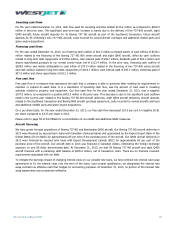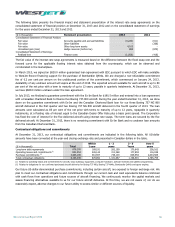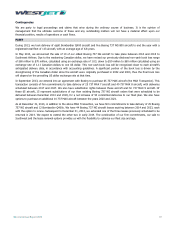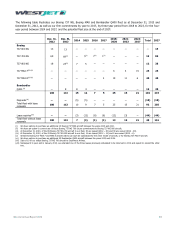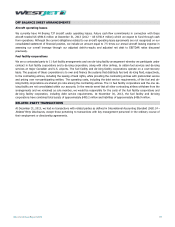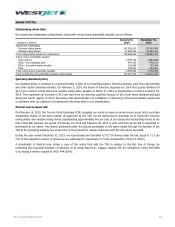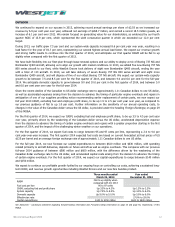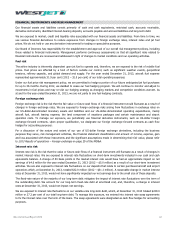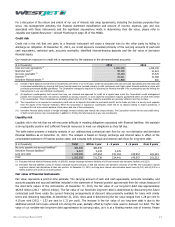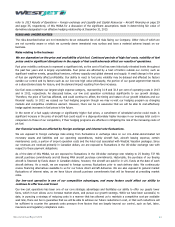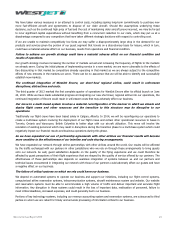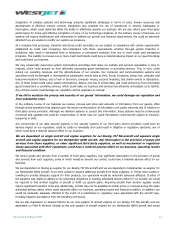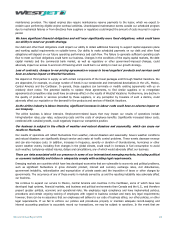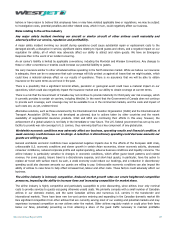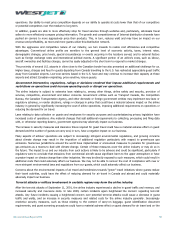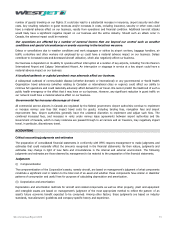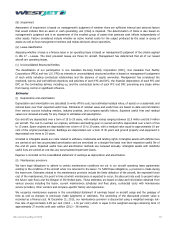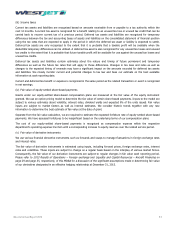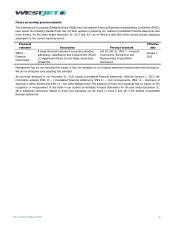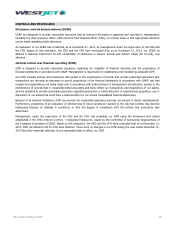Westjet 2013 Annual Report Download - page 45
Download and view the complete annual report
Please find page 45 of the 2013 Westjet annual report below. You can navigate through the pages in the report by either clicking on the pages listed below, or by using the keyword search tool below to find specific information within the annual report.
WestJet Annual Report 2013 45
We have taken various measures in an attempt to control costs, including signing long-term commitments to purchase new
more fuel-efficient aircraft and agreements to dispose of our older aircraft. Should the assumptions underlying these
decisions, such as the continued high price of fuel and the cost of maintaining older aircraft prove incorrect, we may be forced
to incur significant capital expenditures without benefiting from a concurrent reduction to our costs, which may put us at a
disadvantage compared to any competitors that have taken different strategic decisions with respect to controlling cost.
If we are unable to maintain competitively low fares we may suffer a disproportionately large drop in the demand for our
products and services given the portion of our guest segment that travels on a discretionary basis for leisure, which in turn,
could have a material adverse effect on our business, results from operations and financial condition.
Failure to achieve our growth strategy could have a material adverse effect on our financial condition and
results of operations.
Our growth strategy involves increasing the number of markets served and increasing the frequency of flights to the markets
we already serve. During the initial phases of implementing service in a new market, we are more vulnerable to the effects of
fare discounting in that market by competitors already operating in that market as we are always subject to the competitive
effects of new entrants in the markets we serve. There can be no assurance that we will be able to identify and successfully
establish new markets.
The continued integration of WestJet Encore, our short-haul regional airline, could result in unforeseen
disruptions, distractions and costs.
The third quarter of 2013 marked the first complete quarter of operations for WestJet Encore after its official launch on June
24, 2013. While we have made substantial progress at integrating our new short-haul, regional airline into our operations, the
continued integration of Encore could result in unforeseen costs that may adversely affect our business.
Our move to a multi-based system involves a material reconfiguration of the manner in which we situate and
deploy flight crews and other resources and the transition to this structure may be disruptive to our
operations.
Traditionally our flight crews have been based solely in Calgary, Alberta. In 2014, we will be reconfiguring our operations to
create a multi-base system involving the deployment of our flight crews and certain other operational resources to bases in
Toronto, Ontario and Vancouver, British Columbia to better align with our aircraft utilization. This move will involve the
relocation of existing personnel which may result in disruptions during the transition phase to a multi-base system which could
negatively impact our financial results and business operations during this phase.
As we have expanded our use of partnership agreements with other airlines our financial results will become
more sensitive to the effectiveness of our interline and code sharing arrangements.
We have expanded our network through airline partnerships with other airlines around the world. Our results will be affected
by the traffic exchanged with our partners in other jurisdictions who we rely on through these arrangements to bring guests
onto our network. As well, guest satisfaction depends on the quality of the flying experience and we could therefore be
affected by guest perceptions of their flight experience that are shaped by the quality of service offered by our partners. The
effectiveness of these partnerships also depends on seamless integration of systems between us and our partners and
technical issues encountered in integrating our network with those of our partners could adversely affect our guests and have
a negative effect on our business.
The failure of critical systems on which we rely could harm our business.
We depend on automated systems to operate our business and support our initiatives, including our flight control systems,
computerized airline reservation systems, telecommunication systems, aircraft maintenance system and website. Our website
and reservation systems must be able to accommodate a high volume of traffic and deliver important and accurate flight
information. Any disruption in these systems could result in the loss of important data, reallocation of personnel, failure to
meet critical deadlines, increased expenses, and could generally harm our business.
Portions of key technology systems, including our revenue accounting system and reservation systems, are outsourced to third
parties on whom we are reliant for timely and accurate processing of information critical to our business.


